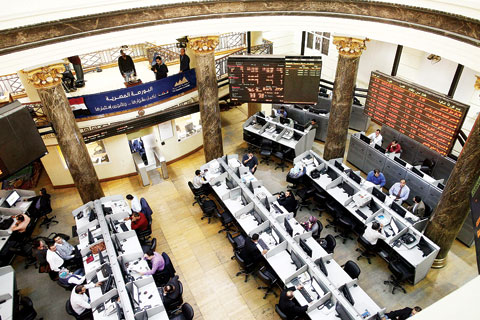
(AFP Photo)
By Sara Aggour and Maha Abdelazim
The Egyptian stock market showed significant positive signs since the beginning of 2014, with the benchmark index EGX-30 hitting 7,116 points on Sunday, a high that has not been reached since the ouster of former president Hosni Mubarak in 2011, leaving many wondering if the market’s most unstable days are now behind it.
In his speech on Saturday, Commander-in-Chief of the Armed Forces Abdel Fatah Al-Sisi did not rule out the idea of running for president.
“I will never turn my back on Egypt,” state-run news agency MENA quoted Al-Sisi saying, adding that if “the people demand it and the army delegates [him]”, Al-Sisi would run for president.
“The second half of the last year went well, which was expected,” said Atef El-Sherif, the adviser to the stock market’s president.
According to a report issued by the Egyptian bourse earlier this month, its main index hiked by 43% in the second half of 2013.
The stock market president’s advisor also pointed out that January usually sees high increases in the bourse’s volume of trade.
“A stock market transition is expected in 2014 aspolitical stability will result in unexpected increases in the bourse,” El-Sherif said, adding that the support of Arab countries will be one of the factors that drive the market upwards.
El-Sherif mentioned that the political situation will be more stable after the Egyptians vote on the constitution’s referendum, slated to take place on 14 and 15 January.
Magdy Toulba, an economic expert and chairman of Arabian House of Consultancy for Financial and Economic Investment, said: “The passing of the constitution will mark the first step towards the political stability the market needs.”
Toulba, who stated that the stock market is the most sensitive sector towards political changes, added that the referendum provides investors with a short-term view on the unfolding of political events.
“The next step, which is even more important than the parliamentary elections, will be the selection of Egypt’s president and I believe Al-Sisi has good chances in running and winning,” Toulba added.
El-Sherif said other factors that may result in stock trade increases include the rise in the trading hours of Nile Bourse and legislative amendments, which involves moving the capital market from the circle of a traditional market to a modern one.
A modern market model aims to protect the investors’ rights while providing a rich trading environment. Through the development of technological structures and the creation of a strong legislative structure, the market will achieve higher levels of efficiency, a bourse press statement explained.
Finance Professor Alaa Mostafa said that political stability is the most important factor for the stock market to regain its stability.
“The stock market depends on savings and investments. The investments depend on the political stability,” Mostafa said, adding that the expectations of investors have pushed the market upwards during the past week.
The Egyptian-Saudi Businessmen Association announced, on 4 January, that it plans to attract 200 companies to invest in Egypt with a total of EGP 2bn, adding that it will establish a fund for small and medium sized enterprises with a value of EGP100m.
Mostafa explained that the government’s spending and policies aim to enhance the economic activity with the cooperation of large companies and encourage investments, which is expected to be reflected in the capital market.
Ups and downs
Despite the fluctuations in the market, the Egyptian bourse report stated that the market has grown by 24%. The total value traded in the market reached EGP 161bn, an increase from the EGP 148bn registered in 2011; however, it fell short of the preceding year’s EGP 185bn.
On 14 August, the stock market’s main index dropped by 1.7%, reaching 5,549 points after pro-Morsi protesters were violently dispersed from Rabaa and Al-Nahda squares, leaving many dead and injured. The first gain the market witnessed was a week later.
Mid-September witnessed a steady and strong surge in the bourse, almost hitting the 5,800 point mark; however, on the 11th day of the continuous rise, the stock market fell short of its target after a 0.64% loss that ended the trading day with 5,667.34 points.
On 7 October EGX-30 rose to register 5,765.8 points, the highest since February. Analysts attributed the gain to the “failed attempt of Muslim Brotherhood supporters to paralyse the state on the previous day”.
On 27 November, the capital market lost around EGP 2.5bn following the Shura Council clashes, where the Central Security Forces (CSF) dispersed protests against the military trials for civilians. A board of directors’ member at the Egyptian stock market denied the relationship between the events, attributing the decline to the series of price corrections that the capital market was experiencing at the time.
On 17 December, the Egyptian main index was pushed to a 35-month high after Minister of Finance Ahmed Galal announced a second EGP 30bn stimulus plan.
Since 6 January, the capital market rose steadily from 6,801 points to reach 6,887.48 point on 8 January, stabilising at 7,116.81 points on 12 January.






